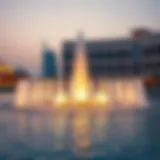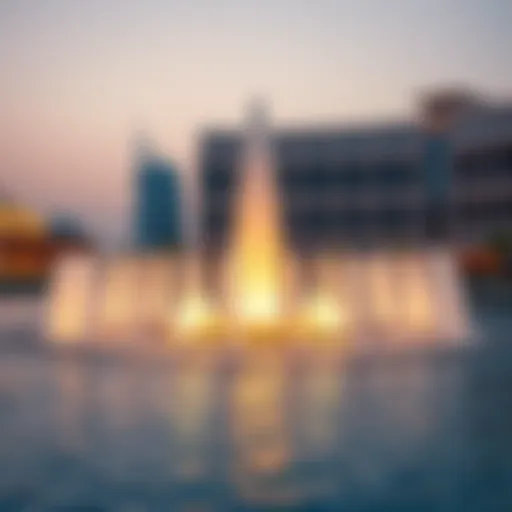Cinema in Dubai: Culture and Modernity Explored
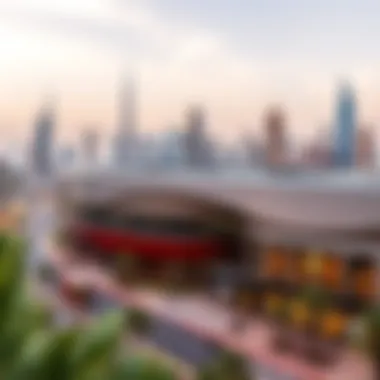
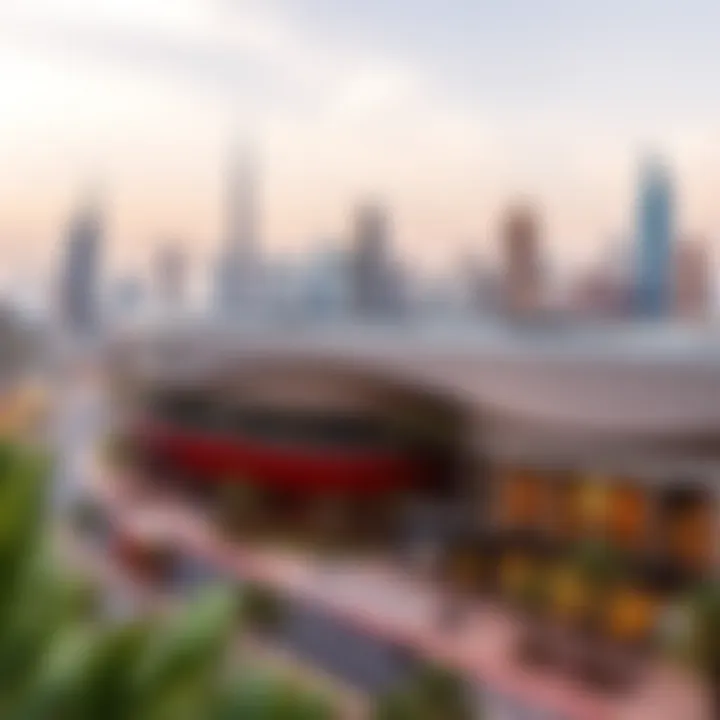
Intro
The cinematic tapestry in Dubai weaves a fascinating narrative, where the threads of culture and modernity entwine. As the city continues to rise as a significant player on the global stage, its film industry mirrors this transformation, drawing influences from both local traditions and cosmopolitan aspirations. The evolution of cinema in Dubai is emblematic of the city itself — a blend of rich heritage and progressive vision, creating a unique atmosphere that fosters innovation in storytelling.
In recent years, film production in Dubai has blossomed. Various factors, including government incentives, a diverse talent pool, and a growing appetite for diverse narratives, have paved the way for a flourishing cinema landscape. It's not just about the blockbuster films; it's about how each production reflects a myriad of voices and perspectives, underlining the multicultural essence of this vibrant city.
By delving deeper into the cinematic offerings here, we get to discern how the arts thrive amid skyscrapers and sandy dunes, and how films produced resonate with the pulse of modern life while paying homage to tradition. This exploration will focus on key aspects such as architecture, local film festivals, and unique viewing experiences that set Dubai apart in the cinematic world.
With a growing audience and an increasing number of film-related initiatives, stakeholders from various sectors — including investors, filmmakers, and audiences — stand to gain insights into the intricate relationship between cinema and the cultural milieu that shapes Dubai. This article will serve as a comprehensive guide, shedding light on the driving forces behind Dubai's film industry, while also examining the trends that may dictate its future trajectory.
As we delve into this exploration, it becomes clear that understanding cinema in Dubai is akin to understanding the city itself; it's a fascinating journey through light, innovation, and cultural diversity.
Market Insights
Current Trends in Dubai's Cinema Scene
With the ongoing advancements in technology and changes in audience preferences, Dubai's cinema scene has experienced remarkable transformations. Recent studies show that there is an increasing demand for diverse content that reflects the multicultural landscape of the city. Films produced here often tackle relatable themes, merging international styles with local flavor.
Here's a closer look at what’s trending:
- Embracing Local Talent: The rise of homegrown filmmakers and actors has significantly changed the dynamics. Local narratives are gaining traction, often showcasing the vibrant culture and traditions of the UAE.
- Genre Exploration: While blockbuster action and romance films draw considerable crowds, genres such as documentaries and experimental art films are also carving out a niche. Audiences are becoming more receptive to stories that reflect realities beyond their everyday experiences.
- Streaming Services: The influence of digital platforms cannot be understated. With the likes of Netflix making substantial investments in the Middle East, there's a focus on producing original content that speaks to regional stories but with global appeal.
With these trends, the landscape is poised for change. The intertwining of traditional cinematic values with modern storytelling techniques showcases creativity rarely seen elsewhere.
Investment Opportunities in Film Production
The government of Dubai has taken proactive measures to stimulate the film industry through various initiatives aimed at attracting filmmakers from around the world. Incentives such as tax breaks, reduced filming costs, and a supportive regulatory framework are drawing new projects to the city.
Prospective investors might consider the following aspects:
- Film Festivals: Events like the Dubai International Film Festival not only underscore the importance of the cinematic arts but also serve as networking hubs for industry professionals, making it an ideal space for investors to connect with creatives.
- Emerging Production Houses: Supporting local production companies can yield a strong return, especially as these entities begin to forge international partnerships and expand their project portfolios.
- Cinematic Real Estate: Investing in locations known for film shoots can be lucrative. Set locations often become tourist attractions, thus contributing to long-term rental opportunities.
In summary, the Dubai cinema scene is more than just entertainment; it represents a rich tapestry of investment potential, fueled by cultural diversity and an appetite for innovation. By focusing on this sector, investors can play a key role in shaping the future of film in this thriving metropolis.
Historical Perspective on Cinema in Dubai
The historical journey of cinema in Dubai offers a fascinating lens through which we can understand the cultural and social evolution of the city. It paints a vivid portrait of how a once-sleepy trading port transformed into a vibrant, cosmopolitan oasis known for its modern skyline and bustling entertainment scene. Recognizing this history is crucial, as it reveals the interplay between traditional values and modern influences that shape today’s film industry.
Early Beginnings of Film in Dubai
The origins of film in Dubai are surprisingly humble, tracing back to the 1960s when motion pictures first made their way into the emirate. Initial screenings often took place in makeshift venues, reflecting the city’s modest beginnings. Local residents gathered in community centers and other non-traditional spaces to enjoy these early films, which were primarily foreign productions. During this time, the film scene lacked the infrastructure and resources that would later burgeon as cinema became a more integral part of Dubai's cultural fabric.
These initial experiences with film laid the groundwork for a growing appreciation of cinema as both an entertainment medium and a cultural conduit. The popularity of such cinematic experiences began to pique the interest of local entrepreneurs, who saw the potential in opening theaters, marking the first step toward the future of cinema in Dubai.
Growth of the Film Industry in the Late Twentieth Century
Fast forward a couple of decades, the late 1970s and 1980s marked a significant turning point in Dubai’s film industry. This period witnessed the establishment of several multiplex theaters, which offered a wider array of films than ever before. Around this time, the influx of expatriates and tourists also played a pivotal role in shaping local cinema. With visitors arriving from diverse backgrounds, cinema began reflecting a broader spectrum of narratives and genres, moving beyond purely Western films.
The late twentieth century can be characterized by a burgeoning film industry that was not just about screenings but also about producing quality content. Diverse filmmaking initiatives began to sprout, leading to the production of locally made films that began to resonate with audiences. The establishment of the Dubai International Film Festival in 2004 was a watershed moment, as it helped to further catalyze the local industry by facilitating the convergence of talent and film enthusiasts from around the globe.
Influence of Global Cinema on Dubai's Film Scene


Dubai’s cinema landscape didn’t develop in isolation; instead, it was deeply influenced by international cinema. The city's Emirati filmmakers and producers have been inspired by global trends while also striving to preserve and capture their unique cultural identities. This fusion has resulted in a more diverse and rich film environment.
The accessibility of international films has expanded viewers' horizons, introducing local audiences to diverse storytelling techniques and cinematic styles. Moreover, collaborations with international filmmakers have nurtured an overall ecosystem where global narratives blend seamlessly with local stories. This exchange of cultures is vital, as it stretches the boundaries of creativity and innovation within Dubai's film industry.
As Dubai continues to evolve as a cultural hub, the historical significance of its film sector serves both as a source of pride and as a foundation for future growth. Understanding this perspective is not merely an academic pursuit; it's about recognizing how cinema reflects society and vice versa, illustrating the myriad influences that have shaped Dubai's unique cinematic identity.
Current Cinema Landscape in Dubai
The cinema landscape in Dubai is a vibrant tapestry woven from myriad threads—cultural influences, evolving technologies, and enthusiastic audiences. This section offers a glimpse into the heartbeat of film culture here, emphasizing the necessary elements that define this ever-growing industry.
Popular Theaters and Cinemas
Dubai boasts a dazzling array of cinemas and theaters, each offering its unique flavor of movie-watching experience. Notably, the Vox Cinemas in Mall of the Emirates and Reel Cinemas in Dubai Marina Mall stand out as premier destinations. These venues offer state-of-the-art technology, plush seating, and engaging atmospheres, making film-watching a luxurious experience.
Moreover, the introduction of specialized screening formats, such as cinema with gourmet dining at the Novo Cinemas and IMAX experiences, showcases the commitment to cater to diverse audiences. This blend of comfort and cutting-edge technology attracts both locals and expats alike, creating a thriving community centered around the appreciation of film.
- Diverse Offerings: Each theater offers a range of films from Hollywood blockbusters to regional Arabic films, appealing to the eclectic tastes of Dubai's population.
- Cultural Events: Theaters regularly host cultural events and screenings, further enriching the cinema-going experience.
Diverse Film Offerings
Within the bustling cinema scene, the diversity of films presented mirrors the multicultural fabric of Dubai itself. From Bollywood hits resonating with the South Asian community to indie films reflecting Arab perspectives, there's something for every cinephile. This variety is not just a matter of entertainment; it sparks conversations among communities, breaking down barriers and fostering mutual understanding.
Here are some key genres and themes:
- International Films dominate the screens, with various festivals featuring selections from around the globe.
- Local Productions are on the rise, showcasing the talent emerging from the UAE and beyond. Such films depict stories that are deeply rooted in local contexts yet often reach universal themes that resonate far abroad.
- Documentaries exploring social issues or environmental concerns are gaining traction, appealing to those wishing to gain insight into pressing matters.
This tapestry of films lays the groundwork for a vibrant dialogue that fuels public interest and contributes to a more nuanced understanding of both local and global narratives.
Impact of Streaming Services
In the face of rapid technological advancements, streaming services are reshaping how audiences in Dubai consume films. Platforms like Netflix, Amazon Prime Video, and regional options such as Shahid VIP have all made significant inroads into the market, offering viewers the chance to enjoy films anytime and anywhere. This shift has profound implications.
Convenience and Accessibility: The availability of vast libraries of films at the touch of a button means that no one in the city feels left out, regardless of their location or schedule.
- Rise of Original Content: Local stories are finding their place on these platforms, challenging the traditional film industry to adapt and integrate with current trends.
- Virtual Film Festivals: The pandemic accelerated the adoption of online film festivals, allowing audiences to experience global cinema without the need to travel. This trend might continue to thrive, opening doors to international collaborations.
Streaming services are democratizing film consumption, enabling audiences to explore genres and stories that the traditional cinema might overlook.
Film Festivals in Dubai
Film festivals in Dubai serve as a significant touchstone in the city’s cinematic evolution. They offer a platform that goes beyond mere screenings; they are vibrant gatherings that promote cultural exchange, celebrate artistic expression, and showcase emerging talent. Engaging filmmakers, critics, and audiences alike, film festivals enable the sharing of stories that resonate on both local and international stages. This connection between diverse cultures enriches the cinematic landscape, ensuring that Dubai’s films are not only a reflection of its identity but also a bridge to global narratives.
Dubai International Film Festival
Established in 2004, the Dubai International Film Festival, often referred to as DIFF, is one of the premier film festivals in the Arab world. For many, this festival has become synonymous with cinematic excellence and cultural significance. Held annually in December, DIFF draws filmmakers and celebrities from around the globe, transforming the city into a cinematic celebration. It showcases a mix of mainstream films and independent works, emphasizing Arab cinema.
The festival often features numerous programs including world premieres, panels, and workshops, offering insights into various aspects of filmmaking. This creates an invaluable opportunity for audiences to engage with the art and the artists directly. Furthermore, the awards presented at DIFF have significant weight, making it a coveted accolade for filmmakers.
For many local filmmakers, the Dubai International Film Festival is not just an event; it’s a launchpad for their cinematic careers.
Emerging Film Festivals in the Region
In addition to DIFF, several emerging film festivals are popping up in Dubai and its surroundings. Festivals like the Emirates Film Festival and the Arab Film Festival are playing an integral role in diversifying the regional cinematic narrative. These festivals emphasize more niche markets and often focus on specific genres or themes, such as documentaries or student films, which provides emerging talents with the opportunity to present their work.


These emerging festivals underscore a growing acknowledgment of the importance of cinema in providing avenues for expression. As they flourish, they also attract attention from investors and sponsors, further embedding the infrastructure of the film industry within the cultural fabric of Dubai.
Role of Festivals in Promoting Local Talent
Film festivals in Dubai are, without a doubt, instrumental in fostering local talent. They provide critical networking opportunities that connect filmmakers, producers, and distributors. Young and aspiring filmmakers can showcase their films in a supportive environment, receiving feedback from peers and industry veterans.
Moreover, these festivals often include competitions specifically for local creators, which not only cultivates a spirit of community but also elevates the profile of Emirati cinema. With their emphasis on local narratives and cultural idiosyncrasies, these festivals help in building a sustainable film economy in the region.
- Networking Opportunities: Local filmmakers meet industry professionals.
- Competitions: Encourage new talent to emerge.
- Cultural Events: Showcase local stories to a wider audience.
As the film scene in Dubai continues to evolve, the role of these festivals is poised to grow, making them critical to the larger narrative of cinema in Dubai.
Government Support and Initiatives
In the ever-evolving landscape of Dubai’s cinema, governmental backing proves crucial. The film industry flourishes under a framework that combines financial aid, regulatory systems, and an invitation for international collaboration. This support not only helps spark creativity but also ensures that the UAE becomes a key player in the global film scene.
Film Production Grants and Incentives
The Dubai government has initiated a range of film production grants and incentives designed to cushion filmmakers, both local and foreign. Such financial aids encourage storytelling that reflects the cultural tapestry of the UAE. For instance, the Dubai Film Commission offers grants that cover a portion of production costs, other than just the monetary help, filmmakers get permits fast-tracked, which reduces bureaucracy – a real time-saver when one is trying to blend the hustle of modernity with rich heritage.
Eligibility criteria are typically straightforward, which invites entries from various genres, including documentaries, features, and even experimental films. By streamlining the application process, the government lets talents shine without drowning in red tape.
Regulatory Framework for Filmmaking
For any filmmaker, understanding the regulations surrounding film production is paramount. In Dubai, a balance has been struck between facilitating creative expression and ensuring cultural sensitivities are respected. The regulatory framework set forth by the UAE has reputation for its comprehensive guidelines, which help maintain a standard while promoting innovative projects.
Filmmakers must get approvals for scripts, locations, and casts, but the good news is the process, while rigorous, is designed to safeguard against potential societal issues while still being an enabler for authentic storytelling. Thus, filmmakers find themselves both restricted and liberated within a well-structured creative environment.
Investment Opportunities for Filmmakers
With a cultural emphasis on film and a government eager to nurture emerging talents, Dubai offers numerous avenues for investment in the film sector. Both local and international filmmakers are drawn to the city due to its appealing business ecosystem. The investments often come in the form of co-productions, regional partnerships, and even venture capital.
Interest from stakeholders, particularly in niche audiences like documentaries on local history or exciting fiction rooted in Emirati culture, broadens the investment landscape. Engaging with local communities adds a unique angle to any film project and taps into valuable resources for filmmakers seeking authenticity.
"By fostering a supportive environment, the government has created a fertile ground for cinematic growth, allowing unique stories to emerge from Dubai's diverse culture."
Such partnerships can not only provide financial backing but also enhance narrative credibility. For instance, expat-centric films have a wide audience appeal, making them an attractive investment.
Overall, without a doubt, government initiatives and support form the backbone of Dubai's cinema industry. They not only allow creativity to flourish but also ensure that the city retains its distinctive essence in an increasingly globalized film market.
Cultural Influences in Dubai's Cinema
The cinema of Dubai stands as a compelling tapestry woven from the rich cultural threads brought together in one of the world’s most cosmopolitan cities. As Dubai continues to evolve, so too does the cinematic landscape, reflecting the diverse cultures that inhabit the region. This section aims to shine a light on the powerful cultural influences that shape Dubai's film industry and reveal the unique narratives that emerge from such a melting pot.
Representation of Diverse Communities
Dubai is a global hub, home to more than 200 nationalities. This diversity, while creating a vibrant social fabric, also transforms the storytelling in its cinema. Films made in Dubai often embrace the stories of various communities, providing a platform for voices that might otherwise remain unheard. For instance, the portrayal of expatriate experiences in films can resonate deeply, showcasing the challenges, aspirations, and everyday lives of the residents from all walks of life.
Through character development and plotlines that accurately reflect real-life connectedness, filmmakers can bridge cultural divides and foster understanding among audiences from different backgrounds. This representation not only makes films relatable but also encourages a greater appreciation for the multifaceted identity of Dubai.
Fusion of Traditional and Modern Themes
The interplay between the traditional and the modern is another striking feature of Dubai's cinema. Filmmakers often find themselves walking a tightrope between honoring the rich heritage of Emirati culture while also embracing contemporary storytelling techniques.
For example, a common theme in many films explores the clash between age-old traditions and the fast-paced, modern lifestyle prevalent in Dubai. This tension can be seen in various genres, from drama to romantic comedies, and it offers audiences both entertainment and food for thought.
By foregrounding these narratives, filmmakers express a nuanced perspective on how cultural evolution dynamically shapes human experience. The stories resonate not just within the borders of the UAE but echo globally, as modernity's clash with tradition is a universal theme.
Challenges and Opportunities in Storytelling
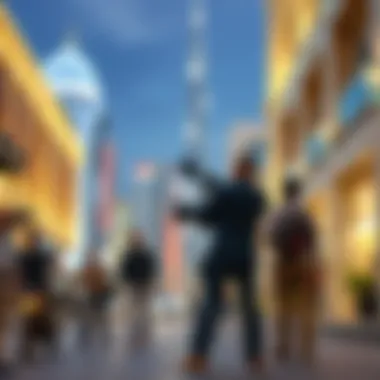

While the cultural influences enhance Dubai's cinematic output, they also present unique challenges. Filmmakers navigate the complexities of balancing cultural sensitivities with creative expression. Certain topics—like political or social issues—may need to be handled with care due to the city's multicultural environment.
However, this isn’t just a dilemma; it’s also a unique opportunity. Restrictions can breed creativity, pushing filmmakers to think outside the box and be innovative in their storytelling approaches. New tools and formats are being utilized, striving to convey authentic messages within permissible limits. Content creators are experimenting with mixed media and digital platforms, making films that are not only culturally relevant but also technologically savvy.
Ultimately, the convergence of various cultural influences in Dubai’s cinema offers both challenges and endless opportunities for rich storytelling, making it a vibrant part of the global film scene.
"A single story isn’t enough to represent the vastness of cultures in Dubai. It’s through multiple narratives that we find depth and understanding."
As the landscape continues to shift, the ongoing dialogue between filmmakers, their communities, and the broader world will no doubt fuel the cinematic evolution in this dynamic city.
For more in-depth information about Dubai's cultural landscape, visit Dubai Culture or Wikipedia's page on Dubai.
Future Trends in Dubai's Film Sector
The film sector in Dubai is poised for transformative changes that resonate with global trends while simultaneously reflecting the unique essence of the region. As the city emerges as a sought-after hub for filmmakers, understanding these future trends can bolster investments and enhance the viewing experience of both residents and tourists alike. The convergence of technology, collaborative efforts, and the expanding audience landscape positions Dubai not only as a player in global cinema but as a trendsetter of sorts.
Technological Innovations in Filmmaking
Advancements in technology have always served as the backbone of the cinematic experience, and Dubai is no exception. The integration of artificial intelligence and augmented reality has started reshaping the narrative and production aspects of filmmaking. For instance, AI-powered analytics can predict viewer preferences, allowing creators to tailor storylines accordingly.
Additionally, the local industry has begun embracing high-definition and immersive sound systems. Local theaters such as the VOX Cinemas are incorporating state-of-the-art facilities that offer a nearly unparalleled viewing experience. In this environment, traditional filmmakers are being encouraged to experiment with 360-degree filming and interactive storytelling techniques, blurring the lines between audience and creator.
With Dubai actively promoting smart city initiatives, filmmakers here may ride the digital wave. As initiatives like the Dubai Smart City project continue developing, filmmakers have greater access to digitally empowered platforms for distribution and promotion.
Increased Global Collaborations
Global partnerships are becoming a hallmark of Dubai's film sector, creating rich tapestries of stories that bridge cultural divides. Filmmakers here are increasingly working alongside artists from varied backgrounds, allowing different perspectives to seep into the storytelling process.
The UAE's strategic location makes it an attractive meeting point for industry professionals from Europe, Asia, and Africa. This not only enriches the local cinema palette but also opens doors for international co-productions. For example, collaborations with Bollywood filmmakers, who have historically drawn inspiration from Dubai’s dazzling architecture, have produced films that have been well-received locally and internationally.
Additionally, platforms such as Dubai Film Development Fund aim to facilitate these partnerships by providing financial support for joint ventures. The Global Film Initiative also plays a pivotal role in nurturing budding filmmakers through international exchange programs, further expanding the creative landscape.
Expanding Audience Demographics
Dubai’s unique demographic composition is an asset for filmmakers as they navigate audience preferences. With a melting pot of cultures residing in the city, local cinemas are increasingly catering to diverse tastes. The rapid growth in the expatriate population has led to demands for films from various regions, including Bollywood, Hollywood, and even independent films from the Arab world.
This trend is significant, as it encourages filmmakers to explore various genres and themes. From light-hearted romantic comedies that resonate with the young millennial crowd to documentaries focusing on local issues, there’s more room than ever for varied storytelling.
Moreover, the rise of the younger generation in the region—tech-savvy and globally conscious—demands fresh narratives that speak to their experiences. As Dubai continues to establish itself as a cultural epicenter, the local film industry is tasked with keeping pace with that evolution, thus creating films that are authentic and relatable.
In closing, the future of Dubai’s film sector is heavily influenced by technology, global partnerships, and demographic shifts. Each element presents not only challenges but also immense opportunities. Those looking to invest or engage with this burgeoning market should keep these trends in mind to ensure they remain at the forefront of this dynamic sector.
Epilogue: The Cinematic Future of Dubai
As we reach the end of this exploration, it becomes crystal clear that the cinematic future of Dubai is bright, multi-faceted, and ever-evolving. Throughout the article, we have seen how the city’s rich tapestry of cultures influences everything from storytelling to visual aesthetics. The combination of government initiatives, diverse film festivals, and local talent shapes a vibrant film landscape that not only serves entertainment needs but also fosters cultural dialogue and global interaction.
Summary of Key Insights
- The fusion of traditional and modern themes in films produced in Dubai is a distinctive feature that attracts audiences both locally and internationally.
- Government support mechanisms, such as grants and regulatory support, play a crucial role in nurturing emerging filmmakers and securing investment in the industry.
- The impact of streaming services is changing viewing habits, providing filmmakers with more avenues to reach global audiences.
These insights underscore the film industry's potential as a driver for economic growth and cultural exchange.
The Role of Cinema in Cultural Exchange
Dubai's cinema acts as more than just a form of entertainment. It is a vital avenue for cultural exchange. Films often reflect the societal norms, values, and diverse experiences of its population, which includes expatriates from virtually every corner of the globe. By viewing films from different communities, audiences gain a deeper understanding of various cultures, promoting tolerance and appreciation.
This practice becomes especially important given the transient nature of Dubai's population. Local filmmakers frequently collaborate with international talents, creating a melting pot of ideas that resonates well with audiences. When films showcase the unique experiences of life in Dubai — be it an expatriate's struggles or the traditional Emirati life — they enrich the overall narrative and create a shared space for dialogue among different cultures.
Final Thoughts on Dubai’s Cinematic Journey
In closing, Dubai’s cinematic journey is one that combines innovation with tradition, local narratives with global perspectives. As more filmmakers emerge and technologies evolve, we can anticipate an even richer array of cinematic offerings. The interaction between global cinematic trends and local storytelling will undoubtedly spawn an array of new genres and formats.
Dubai stands at a crossroads, where it has the capacity to be a leader in film production within the region. However, this will require ongoing commitment not just from filmmakers but also from investors and policymakers. The goal should be to bolster a thriving environment that celebrates storytelling in all its forms. As we turn the page to the next chapter in Dubai's film industry, one can only imagine the branches that will grow from the firm roots planted in cultural diversity and creativity.






